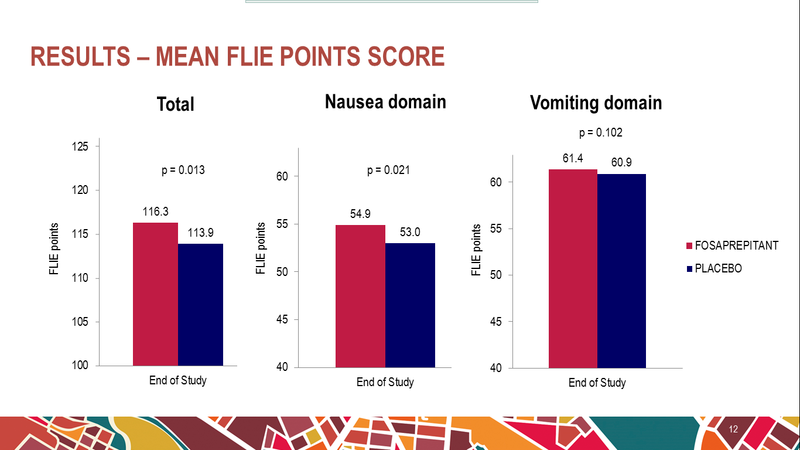Nausea had less of an impact on the daily function of women with cervical cancer treated with fosaprepitant in combination with palonosetron and dexamethasone during five weeks of chemoradiotherapy as compared to similar woman receiving placebo, according to findings presented at ESMO 2017, the Annual Congress of the European Society for Medical Oncology in Madrid, Spain.
Christina H. Ruhlmann of the Department of Oncology, Odense University Hospital, Odense, Denmark presented findings from an analysis of data supporting the secondary endpoint of the GAND-emesis trial (EudraCT number: 2009-014691-21, ClinicalTrials.gov: NCT 01074697), which was a multinational, randomised, double-blind, placebo-controlled phase III trial.
The trial investigated the efficacy and safety of fosaprepitant, a neurokinin-1 receptor antagonist, combined with palonosetron and dexamethasone in preventing nausea and vomiting in women with cervical cancer receiving 5 weeks of fractionated radiotherapy and concomitant weekly cisplatin. The study demonstrated a 17% increase in the proportion of patients that were able to complete the full five weeks of treatment without vomiting with the addition fosaprepitant to palonosetron and dexamethasone.1
In the GAND-emesis trial, 234 patients received study medication; of these, 118 patients received fosaprepitant and 116 patients received placebo. The patients completed the Functional Living Index – Emesis (FLIE) questionnaire at baseline and again at end of study (EoS). The scores for each domain and the total score were calculated according to the FLIE Manual with domain scores ≥ 54 and a total score ≥ 108 indicative of no, or minimal impact on daily life. Nine patients were excluded due to invalid questionnaires.
One of the secondary endpoints of the GAND-emesis study was whether there was any difference in impairment of daily functional life between treatment groups as a result of nausea or vomiting.The investigators used the validated FLIE questionnaire comprising 18-items that measure the impact of nausea (9 items per domain) and vomiting (9 items per domain) on daily functional life.
The baseline point scores were similar between the fosaprepitant and placebo cohorts. Patients in the fosaprepitant arm had scores of 59.9 compared to 60.3 in the placebo group for the nausea domain (p = 0.31). The scores for the vomiting domain were 61.9 versus 62.1 (p = 0.16), and the total scores were 121.8 versus 122.4 for patients receiving fosaprepitant versus placebo, respectively (p = 0.37).
The difference between the fosaprepitant and placebo groups according to an analysis using the Kruskal-Wallis H test at EoS showed a statistically significant difference in the point scores for the nausea domain and the total score between the fosaprepitant and placebo cohorts. The nausea domain scores were 54.9 versus 53 (p = 0.02), the vomiting domain scores were 61.4 versus 60.9 (p = 0.10), and the difference in the total scores was 116.3 versus 113.9, in the fosaprepitant and placebo cohorts, respectively (p = 0.01).
Conclusions
The authors concluded that, to their knowledge, this was the first study to investigate safety and efficacy of a neurokinin-1 receptor antagonist during 5 weeks of radiotherapy and concomitant weekly cisplatin and to evaluate the impact on daily function of fosaprepitant during the entire course of concomitant chemo-radiotherapy.
The addition of fosaprepitant to palonosetron and dexamethasone improved emetic control and also provided a clinically and statistically significant reduction of the impact of nausea on patients’ daily functional life.
Karin Jordan of the University of Heidelberg, Germany who discussed the study results said that we have to thank the authors for providing us with data for the first time on a NK1 receptor antagonist containing regimen in chemo-radiotherapy induced nausea and vomiting in a randomised fashion and moreover for first time showing data about the impact of nausea on daily function in chemo-radiotherapy.


Δεν υπάρχουν σχόλια:
Δημοσίευση σχολίου